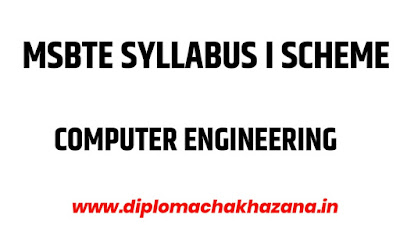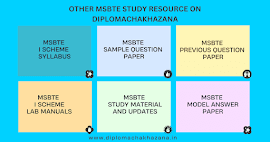2.MSBTE Lab Manuals I scheme Electrical Engineering
3.MSBTE Sample Question Paper I Scheme Electrical Engineering
4.MSBTE Previous Year Question Papers I Scheme Electrical
Engineering
5.MSBTE Model Answer Papers I Scheme Electrical Engineering
6.MSBTE Study Material I Scheme Electrical Engineering
MSBTE question paper I scheme 1st sem electrical engineering
22103 Basic Mathematics Question Papers I Scheme
22101 English Question Papers I Scheme
MSBTE question paper I scheme 2nd sem electrical engineering
22214 Mechanical-Engineering Question Paper I Scheme
22210 Applied Mathematics Question Paper I Scheme
22212 Fundamentals of Electrical Engineering Question Paper I
Scheme
22213 Elements of Electronics Engineering Question Paper I Scheme
MSBTE question paper I scheme 3rd sem electrical engineering
22420-Industrial Measurements Question Paper I Scheme
22419 Electrical Power Transmission and Distribution Question Paper I
Scheme
22418 Electric Motors and Transformers Question Paper I Scheme
22421-Digital Electronics and Microcontroller Applications
Question Paper I Scheme
MSBTE question paper I scheme 4th sem electrical engineering
22420-Industrial Measurements Question Paper I Scheme
22419 Electrical Power Transmission and Distribution Question Paper
I Scheme
22418 Electric Motors and Transformers Question Paper I
Scheme
22421-Digital Electronics and Microcontroller Applications Question
Paper I Scheme
MSBTE question paper I scheme 5th sem electrical engineering
22524-Switchgear And Protection Question Paper I Scheme
22523-Industrial AC Machines Question Paper I Scheme
22525-Energy Conversation And Audit Question Paper I Scheme
MSBTE question paper I scheme 6th sem electrical engineering
From above links you can download
MSBTE electrical engineering question papers.
FAQ:-
1)What are the different type of electrical engineering degrees?
Ans:-
There are several different types of electrical engineering degrees,
including:
1)Bachelor's degree in Electrical Engineering (BSEE): This is a
four-year undergraduate degree that covers the basics of electrical
engineering, including topics like circuits, electronics, and power
systems.
2)Master's degree in Electrical Engineering (MSEE): This is a
graduate-level degree that builds upon the fundamentals learned in a
BSEE program. Students may choose to specialize in areas such as control
systems, communications, or power electronics.
3)Doctor of Philosophy in Electrical Engineering (Ph.D. in EE): This is
a research-based degree that prepares students for careers in academia
or advanced research positions in industry. Students typically complete
coursework and conduct original research in a specific area of
electrical engineering.
4)Associate's degree in Electrical Engineering Technology (AAS in EET):
This is a two-year program that focuses on practical skills and
applications of electrical engineering, such as electrical design,
testing, and troubleshooting. Graduates may work in technical positions
in industry or continue their education with a BSEE.
5)Bachelor's degree in Computer Engineering (BSCmpE): This degree
program combines the principles of electrical engineering with computer
science to prepare students for careers in fields such as computer
hardware design, embedded systems, and robotics.
2)What is difference between electrical engineering and computer
engineering?
Ans:-Electrical engineering and computer engineering are two related but
distinct fields of engineering that focus on different aspects of modern
technology. While there is some overlap between the two fields, there are
some key differences between electrical engineering and computer
engineering:
1.Scope: Electrical engineering deals with the generation, transmission,
and distribution of electrical power, as well as the design and analysis
of electrical circuits, systems, and devices. Computer engineering, on the
other hand, focuses on the design and development of computer systems and
hardware, as well as the software that runs on them.
2.Emphasis: Electrical engineering places a greater emphasis on the
physical components of electrical systems, such as circuit boards, motors,
generators, and transformers. Computer engineering, on the other hand,
focuses more on the digital components of computer systems, such as
microprocessors, memory chips, and input/output devices.
3.Applications: Electrical engineering is applied in a wide range of
industries, including power generation, telecommunications,
transportation, and consumer electronics. Computer engineering is used
primarily in the design and development of computer hardware and software,
as well as in related fields such as robotics, control systems, and
embedded systems.
4.Curriculum: While both electrical and computer engineering programs
cover fundamental topics such as circuits, signals, and systems, computer
engineering programs typically include more courses in computer science,
programming, and software engineering, while electrical engineering
programs focus more on power systems, electromagnetism, and analog
electronics.
In summary, electrical engineering and computer engineering are both
essential fields of engineering that play important roles in shaping
modern technology, but they differ in their emphasis, scope, applications,
and curriculum.
3.What is MSBTE
Ans:-
Maharashtra State Board of Technical Education (MSBTE) is an autonomous
Board of Government of Maharashtra mandated to regulate matters
pertaining to Diploma Level Technical education in the state. Curriculum
development- it’s efficient implementation strategies through faculty
development programs, student development initiatives,
industry-institution interaction, Academic monitoring and various online
evaluation activities have been the significant insignia of MSBTE. In
the recent past, MSBTE has made its foray into skill development
activities, thus broadening its horizon and area of service. However,
the revision of curricular to suit the essentially of industry as
expected from diploma students had become a dire need and of late a very
important parameter for employ ability which has been accomplished and
implemented from the academic year 2017-18.
Having been closely associated with the system and from the suggestions
and feedback of the stake holders, it shall be my endeavor to revamp the
various processes and adopt better technological implementation &
evaluation techniques for the benefit of stake holder students.
Conclusion:-
In this post MSBTE Electrical Engineering students can
download I scheme question paper and then practice for the msbte
exam.










0 Comments
Please feel free to comment. Being diploma students We are always ready to help diploma Students